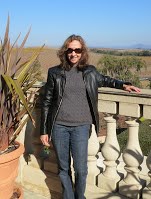 Judy Frauman has spent most of her career working for manufacturing firms, including startups in the energy efficiency and renewable energy arenas. She has had a long-standing passion for environmental causes, and to help feed that passion, she’s volunteered for a number of organizations, including Engineers Without Borders (EWB), an organization that supports communities around the world to help themselves meet the most basic human needs such as clean water, sanitation, and energy. In her work with EWB, she helped design a photovoltaic system for a rural school in Tanzania, and supported a team providing clean water to a coastal village in Ecuador. She spent several years volunteering for the Northwest Chapter of the Association of Energy Services Professionals, a group that provides networking and educational opportunities in energy efficiency and renewable energy. Today she is thrilled to serve on the board for the Women’s Environmental Network, where she combines her environmental interest with helping women advance in the workplace. She holds a BS in Mechanical Engineering.
Judy Frauman has spent most of her career working for manufacturing firms, including startups in the energy efficiency and renewable energy arenas. She has had a long-standing passion for environmental causes, and to help feed that passion, she’s volunteered for a number of organizations, including Engineers Without Borders (EWB), an organization that supports communities around the world to help themselves meet the most basic human needs such as clean water, sanitation, and energy. In her work with EWB, she helped design a photovoltaic system for a rural school in Tanzania, and supported a team providing clean water to a coastal village in Ecuador. She spent several years volunteering for the Northwest Chapter of the Association of Energy Services Professionals, a group that provides networking and educational opportunities in energy efficiency and renewable energy. Today she is thrilled to serve on the board for the Women’s Environmental Network, where she combines her environmental interest with helping women advance in the workplace. She holds a BS in Mechanical Engineering.
How did you become involved in your current career?
I fell into Quality Engineering a number of years ago and it fed my interest in how data tells a story. As a Quality Engineer, I use statistics to tell me how capable a supplier is of making good parts, consistently. While my career hasn’t been directly involved with the environment, ensuring that a supplier isn’t going to waste energy and materials making bad parts does have a positive impact, and of course it benefits companies in their bottom line.
What environmental issues are of most concern to you?
What isn’t of concern to me?! If I had to pick something, it would certainly be our changing climate and the impact it’s having not only on humans, but also on the other species that share our planet. But I have confidence that we will continue to innovate solutions that reduce our energy footprint.
One of the more fascinating and promising developments I’ve seen is clean cookstoves. This simple innovation, by greatly reducing the amount of fuel needed and smoke produced, can help mitigate climate change, reduce pollution, and improve the health of those doing the cooking. Multiply this reduction in one cookstove by the 3 billion people relying on them, and it’s easy to see the impact this has on the world. By using less fuel, most often wood products, deforestation is curbed; and notably, women’s safety is another outcome. Women are the traditional gatherers of wood products, spending hours daily to locate dwindling sources of wood, venturing further and further away from home, where they are vulnerable to assault. Reduce the fuel, improve women’s lives. It’s remarkable that something as seemingly mundane as a cookstove can be a panacea for a number of the world’s problems.
What do you think are some challenges and opportunities facing women in the environmental movement today?
The same challenges that face women in all realms of the workplace, not just the environmental movement, is gaining the same credibility as men. We clearly still have to prove ourselves more so than our male counterparts. But the past 40 years have seen tremendous inroads from the 1970’s, a time when it was questioned whether a female news anchor could be taken seriously. We need to march ahead as if we did not have a steeper path to climb and not get discouraged by obstacles that others may throw (intentionally or not) in that path. We also need to support each other and not be part of the problem of holding women back.
What are your suggestions on how WEN members can become more involved in your sector and the environmental movement?
Even if your current job isn’t directly involved with the environment, volunteer for organizations that are part of the solution. There is great satisfaction to be had, regardless of whether it results in a paycheck.
